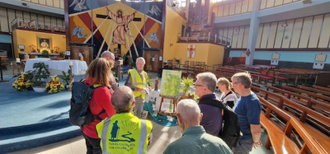The Columban Way: A Pilgrim's Reflection

One stop of the 'Turas'. Image: Pat Colgan
The theme for the Catholic Holy Year 2025 is 'Pilgrims of Hope', and the theme of the global Season of Creation (Sept/Oct 2024) is 'To Hope and Act with Creation'. Hope is one of the three great virtues and in his catechesis of 13 May 2024, Pope Francis reminded us that "Hope, for a Christian, is Jesus himself" and that "we sin against hope when we remain anchored in the past, forgetting that God loves us, that he is merciful and greater than our heart."
It was with joyful hope, mixed with some apprehension, that a group of pilgrims began walking from the birthplace of St Columbanus, near Mount Leinster in Myshall, Co Carlow, headed to Bangor, Co Down in a 360-mile route that would bring them through two of Ireland's Provinces, nine of its counties and two political jurisdictions over 37 days. Columbanus - also known as Columban and who lived 543-615AD - was based at Bangor Abbey, the great monastic seat of learning in Northern Ireland, before he travelled to the European continent.
The theme of the 'Turas' (Irish for 'journey' or 'pilgrimage') was 'Peace, Healing and Well-being'. Each day began with a moment of prayer for persons, nations or communities in conflict, as well as the healing of historical memories in Ireland due to 'The Troubles', as well as the more recent challenges of drug abuse, adverse reactions to large-scale immigration, church scandals and the epidemic of mental illness, especially the depression and loneliness so prevalent in modern Ireland.
The pilgrims were joined each day - or for a number of days - by well-wishers, curious bystanders, school students, family members or others who wished to be part of this journey of discovery. This included, on Day 26, the Primates of both the Catholic and Church of Ireland.
While St Columbanus has been called, "the father of all who seek to construct a more united Europe" (Robert Schumann, French Foreign Minister at Luxeuil-le-Bains in 1957) and is well known in the parts of France, Germany, Switzerland and Italy where he established monasteries, he is much less known in his own homeland - another reason for the pilgrimage.
The European Meeting of the Associations of the Friends of Columbanus will be hosted for the first time on Southern Irish soil in Carlow next July at the invitation of Bishop Denis Nulty, after 26 years of such meetings on the continent (and once in N Ireland). His diocese of Kildare and Leighlin, as well as Carlow County Council, Tourism Board, the local business and cultural community and volunteers have been outstanding in their support for the Turas as have been the Bangor-based branch of Columbanus Friends, where the Turas ended on 21 September 2024.
I was privileged to be a pilgrim with the group on three occasions during the 37 days. Most memorable to me were the encounters I and others had with people on the road. These ranged from friendly chats about the weather, inquiries about whether we were collecting for a charity, request for a prayer, the offer of a roadside blessing (from at least two clergymen) or a simple sharing that they are not feeling so well today or worries about their health, partner or children.
There was a remarkably ecumenical feel to the 'Turas'. We joined a Presbyterian Sunday service in Co Cavan, were fed at Killinchy Parish Church of Ireland, and dropped into St John the Baptist (also Church of Ireland) Church for a thanksgiving and blessing before the last 10 kms of the Turas from Helen's Bay to Bangor.
On that final stretch, approximately 100 people swelled our ranks and celebrated our arrival at Bangor Abbey, where Rev Ronnie Nesbit and Bishop Alan McGuckian SJ awaited us. They then joined us for a civic reception at St Comgall's Catholic Church Hall, together with the Mayors of Ards and North Down and Carlow. We saw a furthering of hope of reconciliation in our land.
Now that the 'Turas' has been completed, proved both possible and safe, and community buy-in guaranteed, plans are now in motion to request the Council of Europe to grant it the status of a European Heritage Trail. This would put it on a par with the Camino de Santiago in Spain, and joining it up with sections of similar Columban and/or Irish monastic Ways on the continent.
One can sense in all of the above a fulfilment of Columbanus' own dictum 1400 years ago, at a time, similar to today, when Europe was riven with divisions: "We are all joint members of one body, whether Franks or Britons or Irish or whatever peoples we come from".
May 'the hope poured into our hearts', the 'hope that does not deceive' (Rom 5:5) accompany this project, helping it to becomes an artery of hope from Ireland to Europe and from there to the whole world.
Fr Pat Colgan is an Irish priest of the Missionary Society of St Columban who worked in Fiji for 17 years and is now based in Ireland.


















